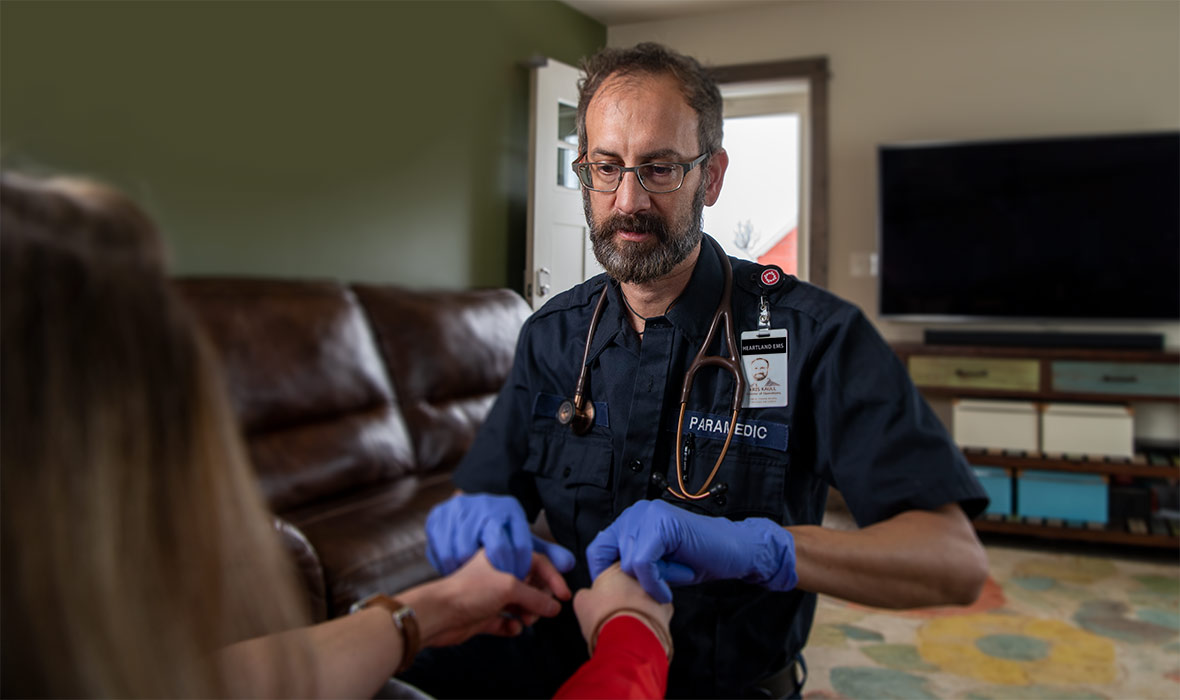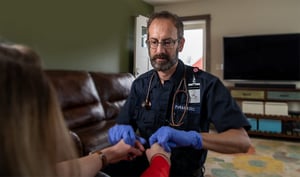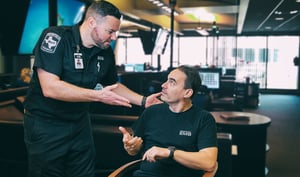Pulsara Around the World - February 2026
January Recap The start of 2026 was on the slow side for our events schedule, with our team heading to the Florida Fire & EMS Conference, the...
3 min read
 Team Pulsara
:
May 20, 2020
Team Pulsara
:
May 20, 2020

Editor's Note: During the 2019 EMS World Expo last year, Pulsara CMO Kris Kaull sat down with Mike Verkest, EMS Training Officer and Host of "Tales and Stories from EMS World," to talk about success, failure, and his experience working in EMS. In celebration of EMS Week, we're sharing our highlights from that interview. (To watch the full interview, check out the video below).
—
Successes are easy to celebrate, and naturally what everyone looks to as an indicator of—well, success. Pulsara’s Chief Marketing Officer, Kris Kaull, knows something about success. Over the course of his career, he co-founded EMS1.com, which is now the largest online resource for paramedics. He then helped launch Pulsara as the Chief Marketing Officer. Kris is an innovator by nature and is constantly trying to improve the lives of patients and caregivers.
But Kris also knows a thing or two about failure. Being an innovator often also means being a disruptor, and people don’t always take kindly to that. “I actually never felt like I fit in," he said. "I didn't do things the way other people did it. I was told, ‘No.’ Or, ‘You need to be quiet, sit backwards in the firetruck.’ 'You need to toe the line. You need to know your role.'” The path to change was not without its share of adversity and pushback, and Kris recognized that innovation doesn't come without pain. “But then you look at innovative and disruptive people. Martin Luther King, murdered. Jesus, crucified. People actually didn't like what was going on with those individuals at the time. I started chewing on that and saying, "Wait, it has been a lot of tough roads. It's been some grit to go through those."

That’s why Kris believes that it’s vital to share our failures with each other. Failures are more relatable than successes because we’ve all been through them. Hearing from someone else that they’ve been in our shoes and made it through makes a big difference. “What was starting to worry me the most is that I was becoming unrelatable because people didn't hear the whole story. They only heard the little bit of the bio, which hits your highlights of the cool things. I should have a bio of all the suffering or when I didn't get high-fived or when things didn't go my way. Because that's a more compelling story and every single person can relate to it.”
How do we encourage those who are discouraged? How do we welcome people from different intellectual backgrounds into EMS, and make them feel that they do belong? "Transparency, mentoring, and gratitude," says Kris. These three practices will help us help one another, and change the future of EMS for the better.

Telling the stories of your challenges can help encourage those around you. You never know how you might positively impact someone by being open about your hardships. It’s easy to get discouraged when it looks like someone else is simply successful at everything they do, says Kris. “Everybody thinks, ‘Brilliant, they're brilliant. They do all these things right.’ But it's not that way. It's the skinned knees and the hard lessons. When someone puts their arm around you and tells you the hard truth, you'll really grow and become a better person.” When others are transparent with their struggles, it helps you realize: it’s not just you. Being open about your challenges with those around you—especially the up-and-coming generation—can help encourage them to keep going.
Kris used the analogy of music and sports to point out that anyone who pursues excellence in those disciplines has a coach. “Coaches can objectively look and make you go from being okay or even really good to being great,” he said. “Be mentored, and then mentor somebody else. Have people that will walk alongside of you, that will give objective advice. And also, pay that forward to others. You don't have to be a mentor to everyone, but if you pick one and forever change their outlook, that's huge.”
You never know whose life you might change, simply by being in it. Kris speaks from experience. “Why did I stay in EMS? Why did I persevere? Why did I help work with EMS1 and Pulsara and do these really fun, cool, awesome things? The bottom line is, during any of those trials and tribulations, there was always at least one, but sometimes more, mentors that put their arm around me and said, ‘I believe in you.’”
 Over the course of his career, Kris has found that gratitude is vital. He told a story about how his family started a practice of coming up with three things they were grateful for every night. “You start looking back and reflect on the day of the smallest little pieces of grace or good things in your life that happened that day. ‘Hey, I had a great conversation with this person. You know what? I went outside and got back to the house before it rained,’ or whatever it is. That changed the outlook in our family, because then you're focusing on the positive.”
Over the course of his career, Kris has found that gratitude is vital. He told a story about how his family started a practice of coming up with three things they were grateful for every night. “You start looking back and reflect on the day of the smallest little pieces of grace or good things in your life that happened that day. ‘Hey, I had a great conversation with this person. You know what? I went outside and got back to the house before it rained,’ or whatever it is. That changed the outlook in our family, because then you're focusing on the positive.”
“When you start looking for the opportunities to be grateful for something, you start seeing them the more often,” Mike agreed. "Because no matter how bad things were that day, there is always something to be grateful for." Dwelling on it can make all the difference.

January Recap The start of 2026 was on the slow side for our events schedule, with our team heading to the Florida Fire & EMS Conference, the...

Recent research shows how Pulsara was successfully leveraged to connect more than 6,000 COVID-19 patients to monoclonal antibody infusion centers via...

At Pulsara, it's our privilege to help serve the people who serve people, and we're always excited to see what they're up to. From large-scale...